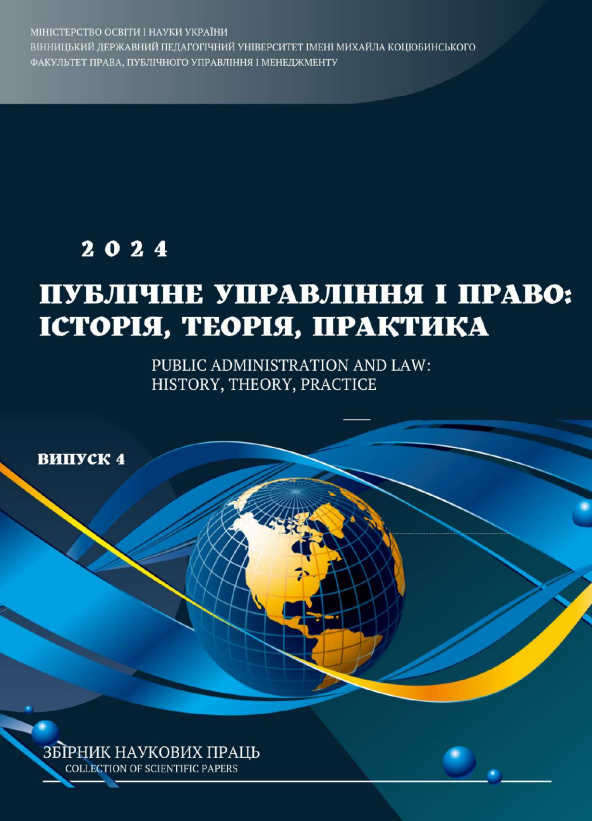Articles
FORMATION OF THE INSTITUTE OF NATIONAL SECURITY: THE EUROPEAN EXPERIENCE
https://doi.org/10.31652/2786-6068-2024-4-74-81Published 2024-09-18
Keywords
- European Union,
- NATO,
- national security,
- collective defense,
- hybrid threats
How to Cite
FORMATION OF THE INSTITUTE OF NATIONAL SECURITY: THE EUROPEAN EXPERIENCE. (2024). Public Management and Law History Theory Practice, 4, 77-84. https://doi.org/10.31652/2786-6068-2024-4-74-81
Abstract
The article analyzes the peculiarities of the organization of the unified European defense system, as part of the national security system of the EU countries. The process of changes in the security architecture of the European Union and issues of foreign policy and defense after the end of the Cold War is considered. The steps taken towards the development of the EU's common foreign and security policy after the Maastricht Treaty, according to which the institute of the Common Foreign and Security Policy was called to strengthen the security of the EU, are specified. The main directions of the defense policy of the European Union defined by the Treaty of Amsterdam are characterized. Changes in the mechanism of cooperation in the field of national security of the EU outlined by the Nice Treaty were noted. The study states that the Russian Federation's full-scale war in Ukraine forced EU countries to change their national security policies and strengthen their own defense capabilities after a long process of disarmament. It is indicated that after the start of the war in Ukraine, the issue of collective defense and security of European countries became dominant in the activities of NATO, which is the guarantor of the territorial defense of the EU. The features of the new EU defense strategy «Strategic Compass», which logically continued the Global Strategy of the European Union in 2016, are characterized. The author notes that in the "Strategic Compass" the Russian Federation is recognized as an aggressor against a neighboring state and poses a threat to European security. A conclusion was made about the potential of EU and NATO priorities and security strategy and the awareness of the urgent need to organize a flexible system of security cooperation for a quick and effective response to the threat of an attack on EU countries. It is noted that under the influence of the war in Ukraine, a strategic shift in the EU's position from «soft» to military force is occurring. It was noted that the EU's foreign policy for decades provided for interaction with other countries on the basis of international law and economic norms, but now there is a need to strengthen the military component of the foreign and security policy, which is characterized by a shift in favor of forceful methods of influence.Downloads
Download data is not yet available.
References
- References:1. Amsterdamskyi dohovir vid 1 travnia 1999 r. [Treaty of Amsterdam dated May 1, 1999]. Retrieved from: https://vue.gov.ua/Amsterdamskyi_dogovir_1997 [in Ukrainian].2. Artyomov, I. (2019). Vyklyky zbroinoi ahresii yak katalizator perezavantazhennia zovnishnoi polityky Ukrainy. [Provocations of armed aggression as a catalyst for restarting Ukraine's foreign policy]. Mizhnarodnyy naukovyy visnyk : zb.nauk.pr. /red.kol. I.Vovkanych ta in. 1-2. Uzhhorod: DVNZ «UzhNU». 67 s.3. Bidochko, I. (2024). Viiskovi navchannia NATO – repetytsiia tretoi svitovoi»: yak rosiiska propahanda reahuie na Steadfast Defender [NATO Military Exercises - Rehearsal for the Third World War: How Russian Propaganda Responds to Steadfast Defender 2024]. MediaSapiens. Retrieved from: https://ms.detector.media/propaganda-ta-vplivi/post/34058/2024-01-25-viyskovi-navchannya-nato repetytsiya-tretoi-svitovoi-yak-rosiyska-propaganda-reaguie-na- steadfast-defender-2024/ [in Ukrainian].4. Voitsikhovsky, A. V. & Bakumov, O. S. (2023). Zbroina ahresiia rosiiskoi federatsii proty Ukrainy yak zahroza systemi kolektyvnoi bezpeky. [Armed aggression of the Russian Federation against Ukraine as a threat to the system of collective security]. Pravo i bezpeka. 1(88). 134-145 [in Ukrainian].5. Voronenko, I.V. & Klymenko, N.A. (2022). Innovatsiinyi rozvytok v umovakh tsyfrovizatsii: otsinka ta priorytety. [Innovative development in conditions of digitalization: assessment and priorities]. Ekonomika ta derzhava. 2. 38-45 [in Ukrainian].6. Gerasimchuk, T. F. (2023). Solidarnist Yevropeiskoho Soiuzu z Ukrainoiu u protydii rosiiskii zbroinii ahresii: bezpekovyi chynnyk. [Solidarity of the European Union with Ukraine in countering Russian armed aggression: a security factor]. Naukovyy zhurnal «Rehionalʹni studiyi». 32. 91-102 [in Ukrainian].7. Dohovir zasnuvannia Yevropeiskoi Spilnoty. [Treaty establishing the European Community] (Maastricht, February 7, 1992). Retrieved from: https://zakon.rada.gov.ua/laws/show/994_029#Text [in Ukrainian].8. Ivasechko, O. & Tsebenko, O. Nova oboronna stratehiia YeS «Stratehichnyi kompas» yak vidpovid na suchasni hibrydni zahrozy. [The new EU defense strategy «Strategic Compass» as a response to modern hybrid threats]. Retrieved from: http://baltijapublishing.lv/omp/index.php/bp/catalog/download/247/6955/14479-1 ?inline=1 [in Ukrainian].9. Kolyushko, S. G. (2023). Transformatsiia polityky NATO shchodo Ukrainy v konteksti rosiisko-ukrainskoi viiny. [Transformation of NATO's policy towards Ukraine in the context of the Russian Ukrainian war]. Visnyk student·sʹkoho naukovoho tovarystva DonNU imeni Vasylya Stusa. 15. 33-37 [in Ukrainian].10. Mizhnarodne publichne pra bo. Mizhnarodnyi zakhyst prav liudyny. (2018). [International public law. International protection of human rights]. za red. T.L. Syroyid. Kharkiv [in Ukrainian].11. NATO zalyshatymetsia osnovoiu yevropeiskoi bezpeky – Borrel. (February 19. 2023). [NATO will remain the basis of European security – Borrell]. Ukrinform. Retrieved from: https://www.ukrinform.ua/rubric-world/3672094-nato-zalisatimetsa-osnovou-evropejskoi-bezpeki borrel.html [in Ukrainian].12. Nikitenko, V. O., Vasylchuk, H. M. & Merzhynskyi E. K. (2022). Merezheva ekonomika yak chynnyk pidvyshchennia efektyvnosti tsyfrovizatsii u konteksti evoliutsii tsyfrovoho suspilstva vid 1G DO 5G. [Network economy as a factor of increasing the efficiency of digitalization in the context of the evolution of digital society from 1G TO 5G]. Humanities studies. 10(87). 112-121 [in Ukrainian].13. Nitstskyi dohovir pro vnesennia zmin ta dopovnen do Dohovoru pro Yevropeiskyi Soiuz, Dohovoriv pro zasnuvannia Yevropeiskykh Spivtovarystv ta deiakykh poviazanykh z nymy aktiv vid 1 liutoho 2003 r. [The Treaty of Nice on Amendments and Additions to the Treaty on European Union, the Treaties Establishing the European Communities and some related acts dated February 1, 2003]. Retrieved from: https://zakon.rada.gov.ua/laws/ show/994_261#Text [in Ukrainian].14. Pravo Yevropeiskoho Soiuzu. (2019). [Law of the European Union]. Pravo. Kharkiv: 442 s. [in Ukrainian].
